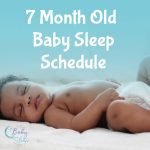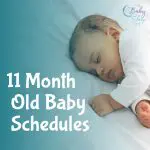
3 month old babies need an average of 11 to 12 hours of sleep at night and 3 to 4 hours of sleep during the day. Therefore, 3-month-old babies sleep a total of 14 to 16 hours of sleep a day, on average. Most babies this age take 4 naps a day. With over 15+ years of experience, this article will provide you with sample 3-month-old baby sleep schedules, including milk feedings for breastfeeding and formula-feeding babies, solids, naps, and nighttime sleep. As a sleep consultant for over 15+ years, I will also share typical sleep habits and tips to get your baby to sleep through the night. Or you can simply skip to the schedule.
In this article:
- 3 Month Old Sleep Habits and Expectations
- Best Bedtime and Total Sleep for a 3-Month-Old
- Night Feedings at 3 Months Old
- How Many Naps at 3 Months?
- When Sleep Gets Worse at 3 Months – Why?
- Feeding a 3 Month Old Baby
- Sample 3 Month Old Baby Schedules
3 Month Old Baby’s Sleep Habits, Development, and Expectations
At 3 months old, your baby is past the newborn stage – quite a milestone! Your baby has been doing a lot of growing and developing in the last 12 weeks, so they, no doubt, look and behave quite differently now than when they were a newborn.
Your baby’s sleep at 3 months old may have started to regulate itself somewhat. For instance, you might notice that your baby is starting to sleep longer stretches at night, and having longer wake windows during the day. This is a great sign, though if that’s not happening, you might not have to worry…yet. Some babies are still waking up quite a bit at this age and can’t stay awake very long between naps. If your baby is waking more frequently than every 3 hours, however, be sure to read below.
Best Bedtime and Total Sleep
Most 3-month-olds need 11-12 hours at night and 3-4 hours of sleep during the day. A typical bedtime at this age is around 6:00 to 8:00 p.m. Consequently, 7:00 p.m. is a standard bedtime for babies this age. However, you will want to start your bedtime routine approximately 20 to 30 minutes before you expect your baby to be asleep. A baby falls asleep easiest when they are NOT overtired so keep that in mind.
You May Also Be Interested In…
Night Feedings at 3 Months Old
Many 3-month-olds are still eating 1-2 times a night and can do one 4-5-hour stretch of sleep without eating. However, breastfeeding babies may still be nursing every 3 hours at night at this age but that will likely change very soon. On the other hand, there are a few formula-feeding babies who eat just once a night or even night-wean this early! All babies are different but 1-2 feedings at night are the average around this age.
You May Also Be Interested In…
How Many Naps for a 3 Month Old?
Most 3-month-old babies take 4 naps each day totaling 3-4 hours. This is primarily because babies this age can’t stay awake longer than 1-2 hours at a time without getting overtired. Pay attention to their sleepy cues and start soothing them down to sleep just as soon as you start to see them. For example, sleepy cues include yawning, staring off into space, and less activity. If your baby is fussy or crying, they are already overtired!
For many 3-month-olds, some naps are just 30 minutes. This is all normal development at this age as it’s highly unusual for babies to take four 1-hour naps. Typically, a baby will take one longer nap at this age and shorter catnaps for the remainder of the day. As your baby grows and matures, he or she will consolidate sleep and transition to just 3 naps by 5-6 months old.
Keep in mind that most babies, at this age, can’t be on a strict schedule because many babies are still taking shorter naps while their brain matures and they simply can not stay up very long to get to the next scheduled nap-time. It’s likely that your 3 month old’s naps are still on the short side but come frequently and every day will still likely be different. Don’t worry, that will change! Most babies can get down to just 3 naps around 6 months or 7 months old.
When Sleep Gets Worse at 3 Months
If your baby has recently started sleeping worse, you may want to read more about this 2 to 3 month time period in a baby’s life.
While teething could be to blame, keep in mind that one of the biggest sleep challenges families face around 3 to 4 months old is the 3 month sleep regression or the 4-month sleep regression. During this sleep regression, your baby’s sleep has changed permanently and your baby must learn to get through their sleep cycles. Of course, this is great news that your baby is developing appropriately, and maybe even a bit earlier than expected, but it’s not always good for your baby’s sleep habits!
You May Also Be Interested In…
3 Month Old Baby Feeding
Your baby will likely also start to consolidate feedings by 3 months old. Your baby’s stomach capacity is considerably larger now than it was in the early days and weeks after birth. A 3-month-old baby will likely be able to go for longer stretches between feedings. Therefore, you may also find that your baby feeds more frequently during the day and is beginning to drop night feedings (although again, if this isn’t the case for you – don’t worry. That’s normal, too!). Do remember, though, that if you are breastfeeding, you’ll want to continue to breastfeed at least every few hours during the day, and your baby will most likely continue to need night feedings at this age too.
If your baby is still waking frequently at 3 months old, you may start to feel like you need to introduce solid food, in order to help your baby sleep. However, keep in mind that starting solids doesn’t usually improve sleep, and 3 months old is still considered too young to begin solid food. Consequently, it’s best to stick exclusively with breastmilk or formula unless your healthcare provider indicates you should do otherwise.
Breast milk or formula should be the primary nutrition for the first year and solids come secondary. Average amounts per day:
• At least 5-7 breastfeeding sessions per day or 2 1/2 ounces of formula for each pound of weight (approx. 20-30 ounces)
• Water is unnecessary (breast milk and formula have plenty of water in them).
For information on starting your baby on solid food, we have a series of blog posts dedicated to the subject. We include recommendations about how and when to start solids, as well as helpful information on food allergies, recommended products, baby-friendly recipes, and more.
You May Also Be Interested In…
Sample 3 Month Old Sleep Schedules
At 3 months old, keep in mind that a baby can typically stay awake just 1-2 hours TOPS before needing to sleep, again. Most importantly, overtired babies tend to wake more frequently at night and take short naps. Here are two different types of schedules to try:
3 Month Old Baby Sample Sleep Schedule: Play-Eat-Sleep (Good for breastfeeding babies, babies with reflux, babies with smaller stomachs, etc.)
| Time | Activity | Notes |
|---|---|---|
| 7:00 AM | Wake and Feed | *Fixed Point |
| 8:30 AM | Feed and Nap | *Fixed Point; 1 1/2 hour Wake Window; ~1-2 hours long |
| 11:30 AM | Feed and Nap | 1 1/2 hour Wake Window; ~30-90 minutes long |
| 2:30 PM | Feed and Nap | 1 1/2 to 2-hour Wake Window; ~30-60 minutes long |
| 5:30 PM | Feed and Catnap | 1 1/2 to 2-hour Wake Window; ~30 minutes long |
| 6:30 PM | Possible Feed (tank up) | |
| 7:30 PM | Start your bedtime routine | |
| 8:00 PM | Feed and Bedtime | *Fixed Point; Max 2-hour Wake Window, ideally |
| 11:00 PM | Dream Feed** | Optional: Done at caretaker’s bedtime so you synch of longest stretch of sleep with yours |
+ 1-3 night feedings
* Consider adding fixed points to your baby’s schedule if you prefer a more predictable schedule. You can read more about this in our article on fixed points in a baby schedule.
** What Is a Dream Feed? Age and How to Do It.
PLEASE NOTE: Breastfed babies often need to eat more often than formula-fed babies. I set these feedings accordingly to maximize nap lengths. If your baby can go 3 hours apart between feedings, you can probably use the sample schedule below instead. You know your baby best!
3 Month Old Baby Sample Sleep Schedule: Eat-Play-Sleep
| Time | Activity | Notes |
|---|---|---|
| 7:00 AM | Wake and Feed | *Fixed Point |
| 8:30 AM | Nap | *Fixed Point; 1 1/2-hour Wake Window; 1-2 hours long |
| 10:00 AM | Feed | |
| 12:00 PM | Nap | 1 1/2-hour Wake Window; 1+ hour long |
| 1:00 PM | Feed | |
| 3:00 PM | Nap | 1 1/2 to 2-hour Wake Window; ~30-60 minutes long |
| 4:00 PM | Feed | |
| 5:30 PM | Catnap | 1 1/2 to 2-hour Wake Window; ~30 minutes long |
| 7:00 PM | Small Feed | |
| 7:30 PM | Start your bedtime routine | |
| 8:00 PM | Feed and Bedtime | *Fixed Point; Max 2-hour Wake Window, ideally |
| 11:00 PM | Dream Feed | Optional: Done at caretaker’s bedtime so you synch of longest stretch of sleep with yours |
+ 1, or possibly 2, night feedings
* Consider adding fixed points to your baby’s schedule if you prefer a more predictable schedule. You can read more about this in our article on fixed points in a baby schedule.
** What Is a Dream Feed? Age and How to Do It.
Note: This schedule follows the eat-play-sleep routine. It is sometimes hard to do at this age if the amount of time between naps is not long enough and your baby wakes too early from his nap because of a feeding.








